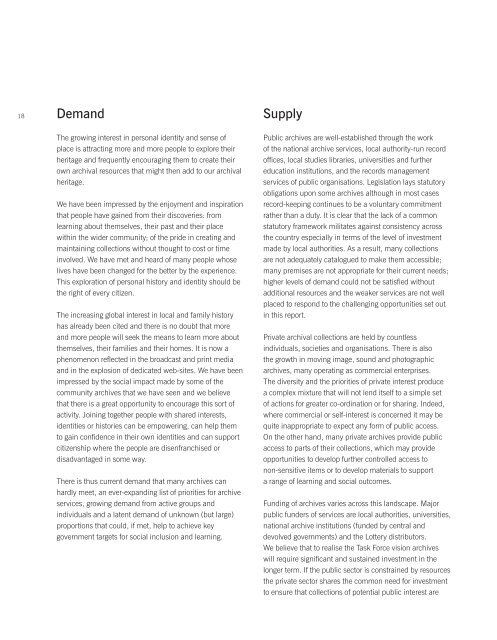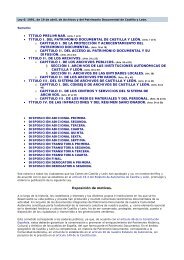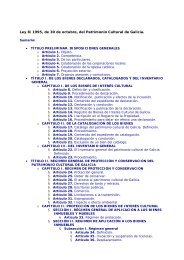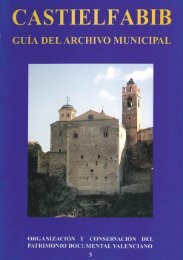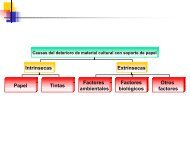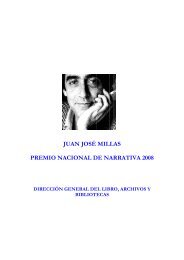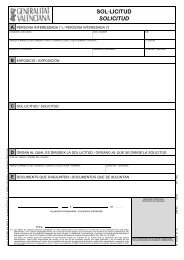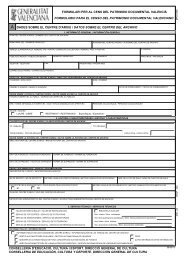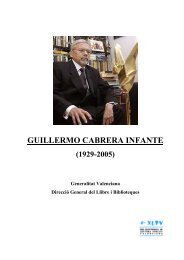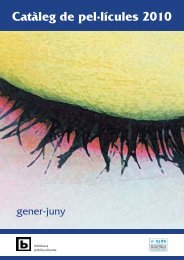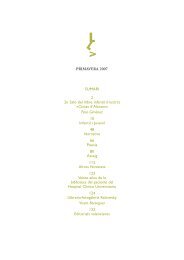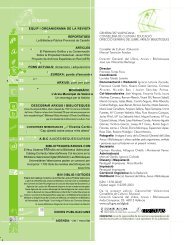Listening to the Past, Speaking to the Future
Listening to the Past, Speaking to the Future
Listening to the Past, Speaking to the Future
- No tags were found...
Create successful ePaper yourself
Turn your PDF publications into a flip-book with our unique Google optimized e-Paper software.
18 DemandThe growing interest in personal identity and sense ofplace is attracting more and more people <strong>to</strong> explore <strong>the</strong>irheritage and frequently encouraging <strong>the</strong>m <strong>to</strong> create <strong>the</strong>irown archival resources that might <strong>the</strong>n add <strong>to</strong> our archivalheritage.We have been impressed by <strong>the</strong> enjoyment and inspirationthat people have gained from <strong>the</strong>ir discoveries: fromlearning about <strong>the</strong>mselves, <strong>the</strong>ir past and <strong>the</strong>ir placewithin <strong>the</strong> wider community; of <strong>the</strong> pride in creating andmaintaining collections without thought <strong>to</strong> cost or timeinvolved. We have met and heard of many people whoselives have been changed for <strong>the</strong> better by <strong>the</strong> experience.This exploration of personal his<strong>to</strong>ry and identity should be<strong>the</strong> right of every citizen.The increasing global interest in local and family his<strong>to</strong>ryhas already been cited and <strong>the</strong>re is no doubt that moreand more people will seek <strong>the</strong> means <strong>to</strong> learn more about<strong>the</strong>mselves, <strong>the</strong>ir families and <strong>the</strong>ir homes. It is now aphenomenon reflected in <strong>the</strong> broadcast and print mediaand in <strong>the</strong> explosion of dedicated web-sites. We have beenimpressed by <strong>the</strong> social impact made by some of <strong>the</strong>community archives that we have seen and we believethat <strong>the</strong>re is a great opportunity <strong>to</strong> encourage this sort ofactivity. Joining <strong>to</strong>ge<strong>the</strong>r people with shared interests,identities or his<strong>to</strong>ries can be empowering, can help <strong>the</strong>m<strong>to</strong> gain confidence in <strong>the</strong>ir own identities and can supportcitizenship where <strong>the</strong> people are disenfranchised ordisadvantaged in some way.There is thus current demand that many archives canhardly meet, an ever-expanding list of priorities for archiveservices, growing demand from active groups andindividuals and a latent demand of unknown (but large)proportions that could, if met, help <strong>to</strong> achieve keygovernment targets for social inclusion and learning.SupplyPublic archives are well-established through <strong>the</strong> workof <strong>the</strong> national archive services, local authority-run recordoffices, local studies libraries, universities and fur<strong>the</strong>reducation institutions, and <strong>the</strong> records managementservices of public organisations. Legislation lays statu<strong>to</strong>ryobligations upon some archives although in most casesrecord-keeping continues <strong>to</strong> be a voluntary commitmentra<strong>the</strong>r than a duty. It is clear that <strong>the</strong> lack of a commonstatu<strong>to</strong>ry framework militates against consistency across<strong>the</strong> country especially in terms of <strong>the</strong> level of investmentmade by local authorities. As a result, many collectionsare not adequately catalogued <strong>to</strong> make <strong>the</strong>m accessible;many premises are not appropriate for <strong>the</strong>ir current needs;higher levels of demand could not be satisfied withoutadditional resources and <strong>the</strong> weaker services are not wellplaced <strong>to</strong> respond <strong>to</strong> <strong>the</strong> challenging opportunities set outin this report.Private archival collections are held by countlessindividuals, societies and organisations. There is also<strong>the</strong> growth in moving image, sound and pho<strong>to</strong>graphicarchives, many operating as commercial enterprises.The diversity and <strong>the</strong> priorities of private interest producea complex mixture that will not lend itself <strong>to</strong> a simple se<strong>to</strong>f actions for greater co-ordination or for sharing. Indeed,where commercial or self-interest is concerned it may bequite inappropriate <strong>to</strong> expect any form of public access.On <strong>the</strong> o<strong>the</strong>r hand, many private archives provide publicaccess <strong>to</strong> parts of <strong>the</strong>ir collections, which may provideopportunities <strong>to</strong> develop fur<strong>the</strong>r controlled access <strong>to</strong>non-sensitive items or <strong>to</strong> develop materials <strong>to</strong> supporta range of learning and social outcomes.Funding of archives varies across this landscape. Majorpublic funders of services are local authorities, universities,national archive institutions (funded by central anddevolved governments) and <strong>the</strong> Lottery distribu<strong>to</strong>rs.We believe that <strong>to</strong> realise <strong>the</strong> Task Force vision archiveswill require significant and sustained investment in <strong>the</strong>longer term. If <strong>the</strong> public sec<strong>to</strong>r is constrained by resources<strong>the</strong> private sec<strong>to</strong>r shares <strong>the</strong> common need for investment<strong>to</strong> ensure that collections of potential public interest are


